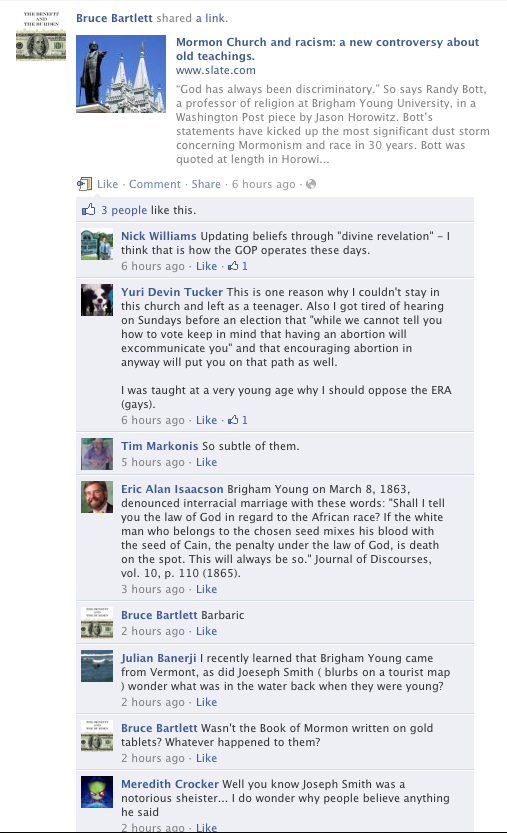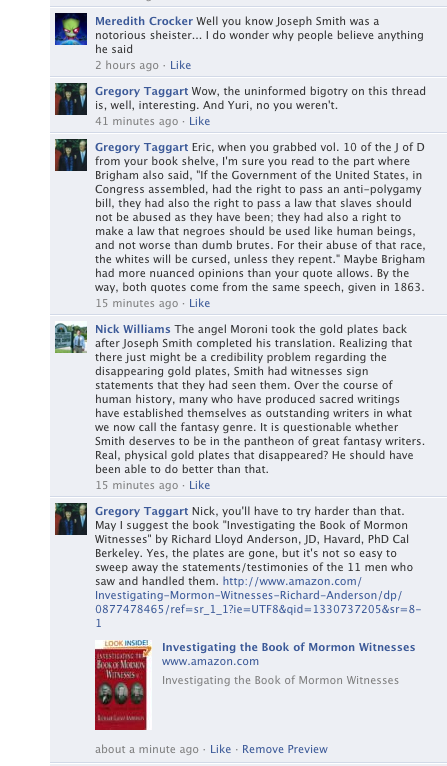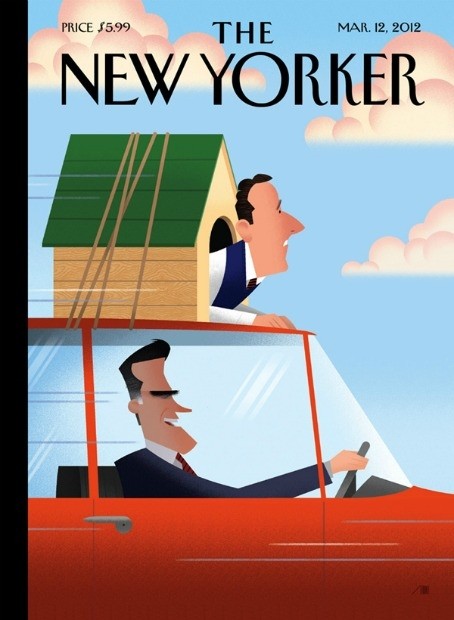Okay, so I’m a Facebook friend with Bruce Bartlett, a one-time big player in D.C., still a player, largely in the economics and tax policy sandbox. He posts on Facebook a lot and has a pretty good following. I toy with de-friending him now and again because he is quite negative generally and very negative when it comes to Republicans. A former member of the party–under Reagan, IIRC–he has since left the party and cannot help himself when it comes to taking potshots at the idiotic Right (his favorite word has to be idiot).
Anyway, yesterday he linked to a story on Slate about the recent Randy Bott controversy and attendant bruhah over Blacks and the Mormon priesthood. (More on that later.) Among other things–and ironically it turns out, given the question Slate posed in the title of the article, “Is Mormonism Still Racist?”–the conversation in on Bartlett’s wall revealed some, shall we say, revealing attitudes about Mormonism:

I rarely stand silently by when people go off on my religion like that, so I entered the fray:

I have no idea where the conversation has gone since my post. I haven’t been back. If I did return, I would ask whether those disparaging Brigham Young would like to have one quote, one aspect of their lives–that part they would be most ashamed of today–paraded around as representative of their entire life. I think I know what the answer would be.
Did Brigham Young have his faults? Yes. Is his quote about interracial marriage offensive? Yes, certainly today, probably then–only much less so. (Presentism is a fallacy we should avoid, by the way.) Does it tell of the whole man? I think not, not even close. And by the way, Brigham was known for firery rhetoric, words he used to stress the importance of what he was saying, but words he never intended to follow through on. I would venture that the interracial marriage rhetoric fits that bill. Yes, he thought interracial marriage was wrong. No, he never intended to kill anybody for marrying someone of another race.
Now, about that Slate article. Therein, the author tells of an informal survey/video that went viral. Apparently a number of BYU students were pretty weak on Black history (emphasis mine):
Just this past month, the BYU campus became embroiled in a controversy concerning racism—or, at the very least, racial insensitivity and ignorance. In a satirical celebration of black history month, comedian David Ackerman dressed in a hoodie, Utah Jazz gear, and blackface, and quizzed BYU students on their knowledge of African-American history. On the video, which went viral, BYU students failed to correctly identify February as black history month and failed to name important black American figures beyond Martin Luther King Jr. and Malcolm X. (The rapper 50 Cent was also named as a hero of black history.) And Ackerman succeeded in getting his painfully naive interviewees to imitate what they believed to be typical black behavior, with finger snapping, the “gangsta limp,” and jive talk all making appearances.
According to Darron Smith—an African-American convert to Mormonism and a BYU alum who, from 1996 to 2006, taught a course there called “The African American Experience”—Ackerman’s video reveals that problematic attitudes about race are not limited to “older generations” of Mormons. Ackerman “provided a microphone for today’s BYU students (even the few black BYU students) to voice their ignorance about the black experience in America.” And while you might very well see something similar at other “isolated, conservative” college campuses around the country, in Smith’s view, the deference of BYU students to church authority makes church leaders responsible for such ignorance—a point now driven home by Bott’s remarks. Smith places the lion’s share of the blame on BYU’s administration. (Smith’s own contract at BYU was not renewed in 2006.)
This indictment is patently unfair. Time was that BYU’s student body came largely from Utah and the intermountain west. That’s no longer the case. Today, 33% of the students are from Utah, 67% from other states. Thirty-six percent come from California (12%), Washington (5%), Texas (5%), Arizona (4%), Colorado (3%), Oregon (3%), Nevada (2%), and Virginia (2%). These students come to BYU with an average GPA of 3.82 (2011) and have SATs to match. Many of these students have served missions throughout the world. In short, they are not blindered, stupid people. They’ve been around. They are simply students, many recently graduated from high school, and they–like their white peers in virtually any and every college across the country–don’t know that much about Black history*. Is that an indictment of BYU, the Mormon Church, or our high schools? I think we all know the answer.
*Of course, this is my hunch. Challenge me, and we’ll all learn the truth. Otherwise, I’ll go with my hunch because I don’t have the time to back up my hunch with research.


